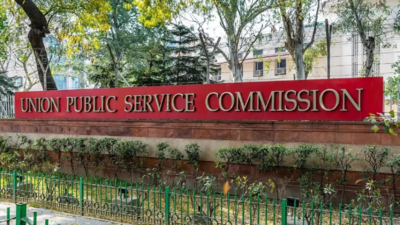- News
- Education News
- News
- UPSC to use Aadhaar for identity verification: Did Puja Khedkar controversy prompt this move?
Trending
UPSC to use Aadhaar for identity verification: Did Puja Khedkar controversy prompt this move?
The Union Public Service Commission (UPSC) will introduce voluntary Aadhaar-based authentication for its exams, following guidelines from the Aadhaar Act. This step aims to bolster exam integrity, particularly in the wake of controversy involving IAS Officer Puja Khedkar, who was accused of identity manipulation in the 2022 Civil Service Examination.

The Union Public Service Commission (UPSC) is set to implement Aadhaar-based authentication for candidates appearing in various examinations. Initially, this will be on a voluntary basis. On Wednesday, the personnel department issued a notification stating that UPSC must adhere to all provisions of the Aadhaar Act, its rules and regulations, and directives from the Unique Identification Authority of India.
According to Wednesday's notification, the personnel department has authorized UPSC to perform Aadhaar authentication voluntarily for verifying candidates' identities at the time of registration on the ‘One Time Registration’ portal and at various stages of examinations or recruitment tests. This will include Yes/No or e-KYC authentication facilities.
The decision aims to enhance the integrity of the UPSC examination process. This move is particularly significant in light of the recent controversy involving IAS Officer Puja Khedkar's candidature in the Civil Service Examination 2022.
Puja Khedkar Controversy
The UPSC issued a show-cause notice to Khedkar for "fraudulently availing attempts beyond the permissible limit provided for in the Examination Rules by faking her identity." In July, the UPSC initiated actions against Khedkar, including registering a forgery case for her attempt to gain undue advantage in the Civil Services Examination by falsifying her identity. The Delhi Police have since registered a case and begun an investigation.
Khedkar, accused of misusing her power and privileges during her training in Pune, had her provisional candidature for the Civil Services Examination (CSE) 2022 canceled by UPSC on July 29. She has been debarred from all future examinations or selections by the commission. In response, Khedkar has challenged her disqualification, arguing that UPSC lacks the authority to take action against her. On August 12, the Delhi High Court issued a notice to the Delhi Police and UPSC regarding Khedkar's anticipatory bail plea.
Grounds for Disqualification from Civil Services Examination
Here are some of the grounds on which UPSC can disqualify a candidate:
According to Wednesday's notification, the personnel department has authorized UPSC to perform Aadhaar authentication voluntarily for verifying candidates' identities at the time of registration on the ‘One Time Registration’ portal and at various stages of examinations or recruitment tests. This will include Yes/No or e-KYC authentication facilities.
The decision aims to enhance the integrity of the UPSC examination process. This move is particularly significant in light of the recent controversy involving IAS Officer Puja Khedkar's candidature in the Civil Service Examination 2022.
Puja Khedkar Controversy
Khedkar was found to have violated rules by manipulating her identity and misusing categories like Other Backward Classes (OBC) non-creamy layer. She has been permanently barred from all future UPSC examinations.
The UPSC issued a show-cause notice to Khedkar for "fraudulently availing attempts beyond the permissible limit provided for in the Examination Rules by faking her identity." In July, the UPSC initiated actions against Khedkar, including registering a forgery case for her attempt to gain undue advantage in the Civil Services Examination by falsifying her identity. The Delhi Police have since registered a case and begun an investigation.
Khedkar, accused of misusing her power and privileges during her training in Pune, had her provisional candidature for the Civil Services Examination (CSE) 2022 canceled by UPSC on July 29. She has been debarred from all future examinations or selections by the commission. In response, Khedkar has challenged her disqualification, arguing that UPSC lacks the authority to take action against her. On August 12, the Delhi High Court issued a notice to the Delhi Police and UPSC regarding Khedkar's anticipatory bail plea.
Grounds for Disqualification from Civil Services Examination
Here are some of the grounds on which UPSC can disqualify a candidate:
- Providing Incorrect or False Information: Candidates found making false statements or suppressing material information are subject to disqualification and possible criminal prosecution. They may also face a 10-year debarment from future examinations and selections by the Commission.
- Misleading Information on Number of Attempts: If a candidate provides misleading information regarding the number of attempts availed, their candidature is canceled for that particular examination, and they are debarred for 10 years from all future examinations/selections by the Commission.
- Tampering with Answer Sheets: Any attempt to tamper with answer sheets, such as marking in an unauthorized manner, using different types of pens if not allowed, or altering the answer sheet after submission, will lead to disqualification.
- Engaging in Unfair Means: Any form of cheating, such as copying from another candidate, using unauthorized materials, or attempting to gain an unfair advantage through deceptive means, is prohibited and leads to immediate disqualification.
- Impersonation: Attempting to appear for the examination on behalf of another person or allowing someone else to appear on their behalf is a serious offense that results in immediate disqualification.
- Providing False Information in Application: Candidates providing false or misleading information about their educational qualifications, age, category, etc., will be disqualified.
End of Article
FOLLOW US ON SOCIAL MEDIA










